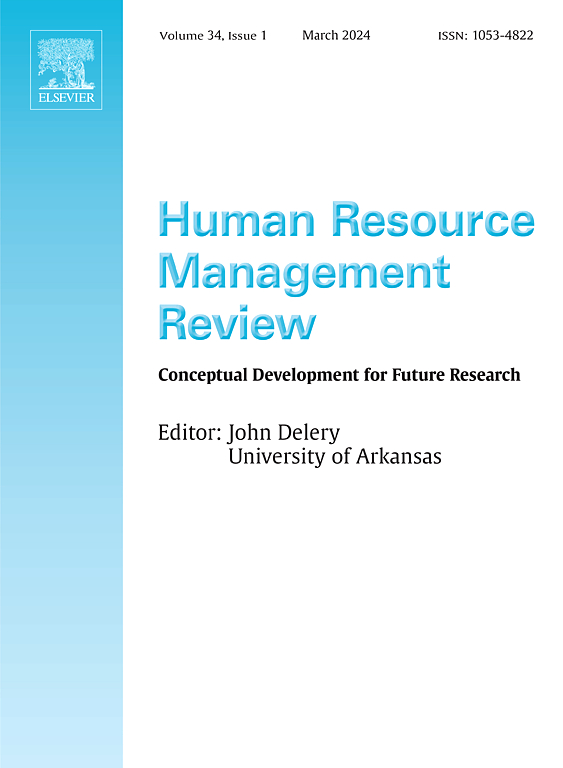What is hybrid work? Towards greater conceptual clarity of a common term and understanding its consequences
IF 13
1区 管理学
Q1 MANAGEMENT
引用次数: 0
Abstract
The concept of ‘hybrid work’, characterized by ongoing alternation between traditional and non-traditional work modes, has gained significant attention in recent research. Despite its growing relevance, a consistent and coherent conceptualization of hybrid work remains elusive. This article aims to address this gap by offering a comprehensive and nuanced understanding of hybrid work, contributing to conceptual clarity in its application. We draw on an extensive literature review to propose a definition of hybrid work that encompasses dynamic switches across three dimensions: modality (analog/face-to-face vs. digital/virtual), location (office/co-located vs. non-office/distributed), and temporality (constrained/synchronous vs. unconstrained/asynchronous). Building on existing literature and our dynamic, three-dimensional, and multilevel definition of hybrid work, we reinterpret key findings within the HRM domain, illustrating how our framework brings clarity to previously ambiguous aspects of hybrid work. This reinterpretation not only underscores the theoretical contributions of our definition but also identifies new research directions inspired by these insights.
什么是混合工作?使一个通用术语的概念更加清晰,并了解其后果
在最近的研究中,以传统和非传统工作模式之间不断交替为特征的“混合工作”概念受到了极大的关注。尽管它的相关性越来越大,但混合工作的一致和连贯的概念化仍然难以捉摸。本文旨在通过提供对混合工作的全面而细致的理解来解决这一差距,有助于其应用中的概念清晰度。我们借鉴了大量的文献综述,提出了混合工作的定义,该定义包含三个维度的动态切换:模态(模拟/面对面vs数字/虚拟),位置(办公室/同址vs非办公室/分布式),以及时间性(受约束/同步vs无约束/异步)。在现有文献和我们对混合工作的动态、三维和多层次定义的基础上,我们重新解释了人力资源管理领域的关键发现,说明了我们的框架如何使混合工作以前模棱两可的方面变得清晰。这种重新解释不仅强调了我们定义的理论贡献,而且确定了受这些见解启发的新的研究方向。
本文章由计算机程序翻译,如有差异,请以英文原文为准。
求助全文
约1分钟内获得全文
求助全文
来源期刊

Human Resource Management Review
MANAGEMENT-
CiteScore
20.20
自引率
7.00%
发文量
0
审稿时长
48 days
期刊介绍:
The Human Resource Management Review (HRMR) is a quarterly academic journal dedicated to publishing scholarly conceptual and theoretical articles in the field of human resource management and related disciplines such as industrial/organizational psychology, human capital, labor relations, and organizational behavior. HRMR encourages manuscripts that address micro-, macro-, or multi-level phenomena concerning the function and processes of human resource management. The journal publishes articles that offer fresh insights to inspire future theory development and empirical research. Critical evaluations of existing concepts, theories, models, and frameworks are also encouraged, as well as quantitative meta-analytical reviews that contribute to conceptual and theoretical understanding.
Subject areas appropriate for HRMR include (but are not limited to) Strategic Human Resource Management, International Human Resource Management, the nature and role of the human resource function in organizations, any specific Human Resource function or activity (e.g., Job Analysis, Job Design, Workforce Planning, Recruitment, Selection and Placement, Performance and Talent Management, Reward Systems, Training, Development, Careers, Safety and Health, Diversity, Fairness, Discrimination, Employment Law, Employee Relations, Labor Relations, Workforce Metrics, HR Analytics, HRM and Technology, Social issues and HRM, Separation and Retention), topics that influence or are influenced by human resource management activities (e.g., Climate, Culture, Change, Leadership and Power, Groups and Teams, Employee Attitudes and Behavior, Individual, team, and/or Organizational Performance), and HRM Research Methods.
 求助内容:
求助内容: 应助结果提醒方式:
应助结果提醒方式:


